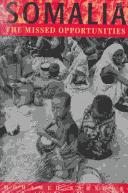| Listing 1 - 10 of 14 | << page >> |
Sort by
|
Book
ISBN: 9781849040426 Year: 2010 Publisher: London : Hurst,
Abstract | Keywords | Export | Availability | Bookmark
 Loading...
Loading...Choose an application
- Reference Manager
- EndNote
- RefWorks (Direct export to RefWorks)
Book
ISBN: 9781846683633 Year: 2011 Publisher: London : Profile Books,
Abstract | Keywords | Export | Availability | Bookmark
 Loading...
Loading...Choose an application
- Reference Manager
- EndNote
- RefWorks (Direct export to RefWorks)
PIRACY--SOMALIA --- SOMALIA--POLITICS AND GOVERNMENT --- SOMALIA--ECONOMIC RELATIONS
Book
ISBN: 9780306821172 Year: 2013 Publisher: Boston : Da Capo Press,
Abstract | Keywords | Export | Availability | Bookmark
 Loading...
Loading...Choose an application
- Reference Manager
- EndNote
- RefWorks (Direct export to RefWorks)
SOMALIA--POLITICS AND GOVERNMENT --- SHABAAB (ORGANIZATION) --- ISLAMIC FUNDAMENTALISM --- TERRORISM--SOMALIA
Book
Abstract | Keywords | Export | Availability | Bookmark
 Loading...
Loading...Choose an application
- Reference Manager
- EndNote
- RefWorks (Direct export to RefWorks)
Piracy is a significant global threat to international sea-borne trade - the life-blood of modern industrial economies and vital for world economic survival. The pirates of today are constantly in the world's news media, preying on private and merchant shipping from small, high-speed vessels. Their targets range from small private yachts - with harrowing stories of individuals faced with seemingly impossible ransom demands - to huge ocean-going tankers and container ships transporting oil and gas, or consumer goods from the new industrial giants in Asia. The 'new' pirates are far from the brutal but romantic figures of popular legend. They are sophisticated operators who have undergone training courses, have advanced weaponry, are radar equipped with electronic tracking devices, have access to onboard advance information, run a highly organized system of motherships and fast-moving skiffs and even form companies enjoying covert state support with access to international finance. But actions can be as horrific as any historical episode, with crews being murdered and whole cargoes being seized. The threat is growing : the International Maritime Bureau recorded 217 attacks from Somali pirates in 2009. Somalia is considered the nest of piracy but hotspots include not only the Red Sea region, but also the whole Indian Ocean, West Africa, Latin America, Southeast Asia, and the South China Seas. The author here provides the historical background to the new piracy, its impact on the shipping and insurance industries and also considers the role of international bodies like the UN and the International Maritime Bureau, international law and the development of advanced naval and military measures. He shows how this 'new' piracy is rooted in the geopolitics and socio-economic conditions of the late-20th century where populations live on the margins and where weak or 'failed states' can encourage criminal activity and even international terrorism.
Book
ISBN: 0813374022 Year: 1988 Publisher: Boulder : Westview Press,
Abstract | Keywords | Export | Availability | Bookmark
 Loading...
Loading...Choose an application
- Reference Manager
- EndNote
- RefWorks (Direct export to RefWorks)
Somalia --- Somalia - Politics and government --- Somalie --- History --- Histoire

ISBN: 1878379356 Year: 1994 Publisher: Washington, D. C. U. S. Institute of Peace Press
Abstract | Keywords | Export | Availability | Bookmark
 Loading...
Loading...Choose an application
- Reference Manager
- EndNote
- RefWorks (Direct export to RefWorks)
Clans --- Insurgency --- History --- Somalia --- Politics and government --- 1960 --- -Insurgency --- 20th century --- Somalia - Politics and government - 1960 --- -Somalia --- -Clans --- Somalia - Politics and government - 1960-
Book
ISBN: 9780415594639 Year: 2011 Publisher: Abingdon, UK : Routledge,
Abstract | Keywords | Export | Availability | Bookmark
 Loading...
Loading...Choose an application
- Reference Manager
- EndNote
- RefWorks (Direct export to RefWorks)
SOMALIA--POLITICS AND GOVERNMENT --- PIRACY--SOMALIA --- TERRORISM--SOMALIA --- FAILED STATES--SOMALIA
Book
ISBN: 270130153X 9782701301532 Year: 1977 Publisher: Paris Berger-Levrault
Abstract | Keywords | Export | Availability | Bookmark
 Loading...
Loading...Choose an application
- Reference Manager
- EndNote
- RefWorks (Direct export to RefWorks)
Politics --- Socialism --- Somalia --- Politics and government --- Economic policy --- Socialism - Somalia --- Somalia - Politics and government - 1960-1991 --- Somalia - Economic policy
Book
ISBN: 2702122612 9782702122617 Year: 1993 Publisher: Paris : Calmann-Lévy,
Abstract | Keywords | Export | Availability | Bookmark
 Loading...
Loading...Choose an application
- Reference Manager
- EndNote
- RefWorks (Direct export to RefWorks)
Economic assistance --- Aide économique --- Somalia --- Somalie --- Politics and government --- Politique et gouvernement --- Politique --- --Guerre --- --Intervention humanitaire --- --War relief --- International relief --- 6905 --- United Nations --- Armed Forces --- Foreign relations --- Social conditions --- Aide économique --- --Politique --- Guerre --- Intervention humanitaire --- War relief - Somalia --- International relief - Somalia --- Somalia - Politics and government - 1991 --- -Somalia - Foreign relations --- Somalia - Social conditions --- War relief
Book
ISBN: 9782296560130 229656013X Year: 2012 Volume: 24 3 Publisher: Paris: L'Harmattan,
Abstract | Keywords | Export | Availability | Bookmark
 Loading...
Loading...Choose an application
- Reference Manager
- EndNote
- RefWorks (Direct export to RefWorks)
Somalia --- Somalie --- History --- Politics and government --- Histoire --- Politique et gouvernement --- Somalia Affair, 1992-1997 --- Peacekeeping forces --- Civil war --- United Nations --- United Nations Operation in Somalia --- Peacekeeping forces - Somalia --- Civil war - Somalia --- Somalia - History - 1991 --- -Somalia - Politics and government - 1991 --- -Somalia Affair, 1992-1997 --- -Somalia
| Listing 1 - 10 of 14 | << page >> |
Sort by
|

 Search
Search Feedback
Feedback About UniCat
About UniCat  Help
Help News
News